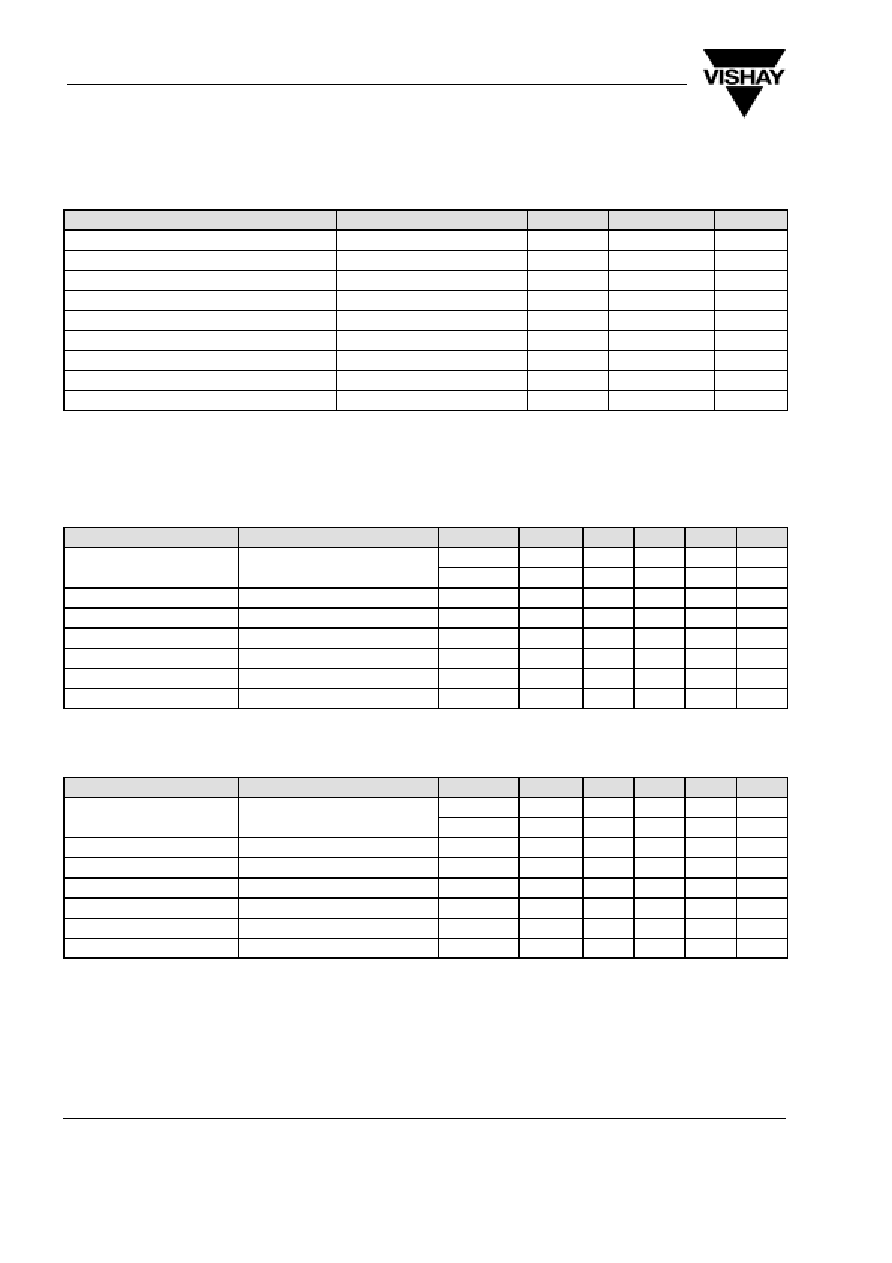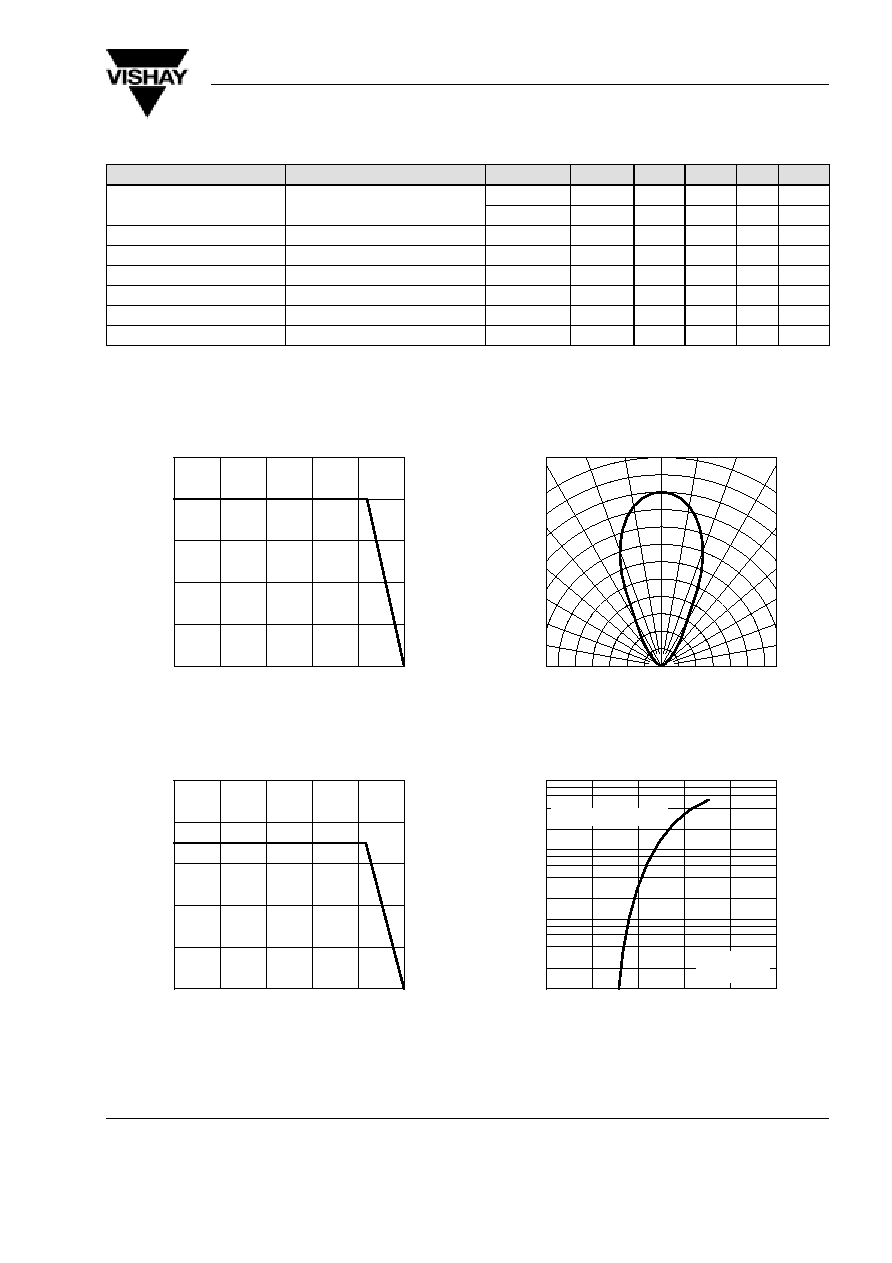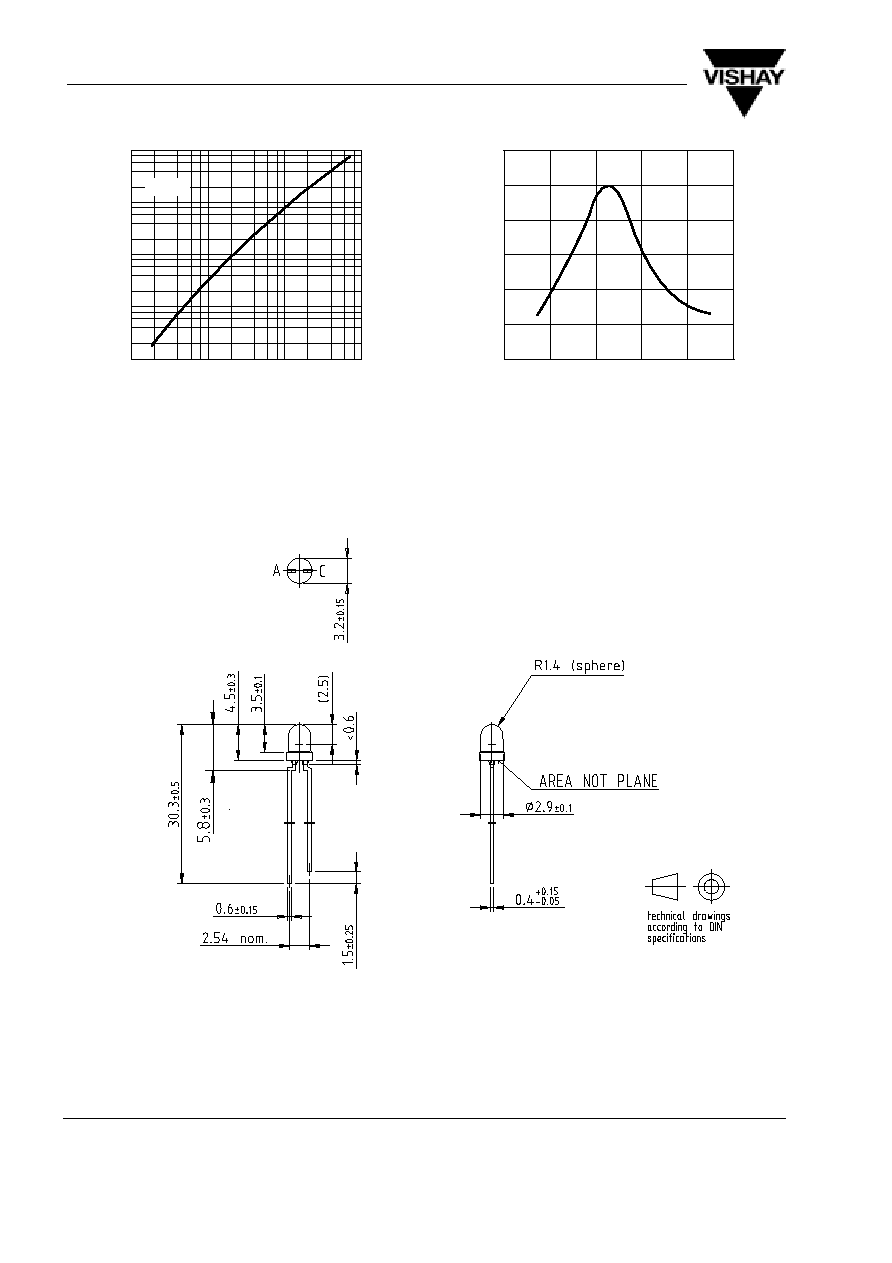 | –≠–ª–µ–∫—Ç—Ä–æ–Ω–Ω—ã–π –∫–æ–º–ø–æ–Ω–µ–Ω—Ç: TLLY440 | –°–∫–∞—á–∞—Ç—å:  PDF PDF  ZIP ZIP |

TLL.440.
Vishay Telefunken
1 (7)
Rev. A1, 04-Feb-99
www.vishay.de
∑
FaxBack +1-408-970-5600
Document Number 83029
Low Current LED in ¯ 3 mm Tinted Diffused Package
Color
Type
Technology
Angle of Half Intensity
±
ˆ
High efficiency red
TLLR440.
GaAsP on GaP
25
∞
Yellow
TLLY440.
GaAsP on GaP
25
∞
Green
TLLG440.
GaP on GaP
25
∞
Features
D
Low power consumption
D
High brightness
D
CMOS/MOS compatible
D
Specified at I
F
= 2 mA
D
Luminous intensity categorized
D
Yellow and green color categorized
94 8488
Applications
Low power DC circuits

TLL.440.
Vishay Telefunken
2 (7)
Rev. A1, 04-Feb-99
www.vishay.de
∑
FaxBack +1-408-970-5600
Document Number 83029
Absolute Maximum Ratings
T
amb
= 25
_
C, unless otherwise specified
TLLR440. ,
TLLY440.
,
TLLG440.
,
Parameter
Test Conditions
Symbol
Value
Unit
Reverse voltage
V
R
6
V
DC forward current
I
F
7
mA
Surge forward current
t
p
10
m
s
I
FSM
0.15
A
Power dissipation
T
amb
84
∞
C
P
V
20
mW
Junction temperature
T
j
100
∞
C
Operating temperature range
T
amb
≠40 to +100
∞
C
Storage temperature range
T
stg
≠55 to +100
∞
C
Soldering temperature
t
5 s, 2 mm from body
T
sd
260
∞
C
Thermal resistance junction/ambient
R
thJA
800
K/W
Optical and Electrical Characteristics
T
amb
= 25
_
C, unless otherwise specified
High efficiency red (
TLLR440. )
Parameter
Test Conditions
Type
Symbol
Min
Typ
Max
Unit
Luminous intensity
I
F
= 2 mA, I
Vmin
/I
Vmax
0.5
TLLR4400
I
V
0.63
1.2
mcd
y
F
Vmin Vmax
TLLR4401
I
V
1
2
mcd
Dominant wavelength
I
F
= 2 mA
l
d
612
625
nm
Peak wavelength
I
F
= 2 mA
l
p
635
nm
Angle of half intensity
I
F
= 2 mA
±
25
deg
Forward voltage
I
F
= 2 mA
V
F
1.9
2.4
V
Reverse voltage
I
R
= 10
m
A
V
R
6
20
V
Junction capacitance
V
R
= 0, f = 1 MHz
C
j
50
pF
Yellow (
TLLY440. )
Parameter
Test Conditions
Type
Symbol
Min
Typ
Max
Unit
Luminous intensity
I
F
= 2 mA, I
Vmin
/I
Vmax
0.5
TLLY4400
I
V
0.63
1.2
mcd
y
F
Vmin Vmax
TLLY4401
I
V
1
2
mcd
Dominant wavelength
I
F
= 2 mA
l
d
581
594
nm
Peak wavelength
I
F
= 2 mA
l
p
585
nm
Angle of half intensity
I
F
= 2 mA
±
25
deg
Forward voltage
I
F
= 2 mA
V
F
2.4
2.9
V
Reverse voltage
I
R
= 10
m
A
V
R
6
20
V
Junction capacitance
V
R
= 0, f = 1 MHz
C
j
50
pF

TLL.440.
Vishay Telefunken
3 (7)
Rev. A1, 04-Feb-99
www.vishay.de
∑
FaxBack +1-408-970-5600
Document Number 83029
Green
(
TLLG440.
)
Parameter
Test Conditions
Type
Symbol
Min
Typ
Max
Unit
Luminous intensity
I
F
= 2 mA, I
Vmin
/I
Vmax
0.5
TLLG4400
I
V
0.63
1.2
mcd
y
F
Vmin Vmax
TLLG4401
I
V
1
2
mcd
Dominant wavelength
I
F
= 2 mA
l
d
562
575
nm
Peak wavelength
I
F
= 2 mA
l
p
565
nm
Angle of half intensity
I
F
= 2 mA
±
25
deg
Forward voltage
I
F
= 2 mA
V
F
1.9
2.4
V
Reverse voltage
I
R
= 10
m
A
V
R
6
20
V
Junction capacitance
V
R
= 0, f = 1 MHz
C
j
50
pF
Typical Characteristics (T
amb
= 25
_
C, unless otherwise specified)
0
20
40
60
80
0
5
10
15
20
25
P
≠ Power Dissipation ( mW
)
V
T
amb
≠ Ambient Temperature (
∞
C )
100
95 10048
Figure 1 Power Dissipation vs. Ambient Temperature
0
20
40
60
80
0
2
4
6
8
10
I ≠ Forward Current ( mA
)
F
T
amb
≠ Ambient Temperature (
∞
C )
100
95 10049
Figure 2 Forward Current vs. Ambient Temperature
0.4
0.2
0
0.2
0.4
0.6
95 10060
0.6
0.9
0.8
0
∞
30
∞
10
∞
20
∞
40
∞
50
∞
60
∞
70
∞
80
∞
0.7
1.0
I ≠ Relative Luminous Intensity
v rel
Figure 3 Rel. Luminous Intensity vs.
Angular Displacement
0
1
2
3
4
0.1
1
10
100
V
F
≠ Forward Voltage ( V )
5
95 10050
I ≠ Forward Current ( mA
)
F
High Efficiency Red
t
p
/T=0.001
t
p
=10
ms
Figure 4 Forward Current vs. Forward Voltage

TLL.440.
Vishay Telefunken
4 (7)
Rev. A1, 04-Feb-99
www.vishay.de
∑
FaxBack +1-408-970-5600
Document Number 83029
0
95 10051
20
40
60
80
100
I ≠ Relative Luminous Intensity
v rel
T
amb
≠ Ambient Temperature (
∞
C )
High Efficiency Red
I
F
=2mA
0
0.4
0.8
1.2
1.6
2.0
Figure 5 Rel. Luminous Intensity vs.
Ambient Temperature
10
20
50
100
200
0
0.4
0.8
1.2
1.6
2.4
96 11490
500
0.5
0.2
0.1
0.05
0.02
1
I
F
(mA)
t
p
/T
I ≠ Relative Luminous Intensity
v rel
2.0
High Efficiency Red
Figure 6 Rel. Lumin. Intensity vs.
Forw. Current/Duty Cycle
0.1
1
10
0.01
0.1
1
10
100
100
95 10061
I ≠ Relative Luminous Intensity
v rel
I
F
≠ Forward Current ( mA )
High Efficiency Red
Figure 7 Relative Luminous Intensity vs. Forward Current
590
610
630
650
670
0
0.2
0.4
0.6
0.8
1.2
690
95 10040
I ≠ Relative Luminous Intensity
v rel
l ≠ Wavelength ( nm )
1.0
High Efficiency Red
Figure 8 Relative Luminous Intensity vs. Wavelength
0
1
2
3
4
0.1
1
10
100
V
F
≠ Forward Voltage ( V )
5
95 10053
I ≠ Forward Current ( mA
)
F
Yellow
t
p
/T=0.001
t
p
=10
ms
Figure 9 Forward Current vs. Forward Voltage
0
0.4
0.8
1.2
1.6
2.0
0
95 10054
20
40
60
80
100
I ≠ Relative Luminous Intensity
v rel
T
amb
≠ Ambient Temperature (
∞
C )
Yellow
Figure 10 Rel. Luminous Intensity vs.
Ambient Temperature

TLL.440.
Vishay Telefunken
5 (7)
Rev. A1, 04-Feb-99
www.vishay.de
∑
FaxBack +1-408-970-5600
Document Number 83029
10
20
50
100
200
0
0.4
0.8
1.2
1.6
2.4
9611590
500
0.5
0.2
0.1
0.05
0.02
1
I
F
(mA)
t
p
/T
I ≠ Relative Luminous Intensity
v rel
2.0
Yellow
Figure 11 Rel. Lumin. Intensity vs.
Forw. Current/Duty Cycle
0.1
1
10
0.01
0.1
1
10
100
100
95 10062
I ≠ Relative Luminous Intensity
v rel
I
F
≠ Forward Current ( mA )
Yellow
Figure 12 Relative Luminous Intensity vs.
Forward Current
550
570
590
610
630
0
0.2
0.4
0.6
0.8
1.2
650
95 10039
I ≠ Relative Luminous Intensity
v rel
l ≠ Wavelength ( nm )
1.0
Yellow
Figure 13 Relative Luminous Intensity vs. Wavelength
0
1
2
3
4
0.1
1
10
100
V
F
≠ Forward Voltage ( V )
5
95 10056
I ≠ Forward Current ( mA
)
F
Green
t
p
/T=0.001
t
p
=10
ms
Figure 14 Forward Current vs. Forward Voltage
0
0
0.4
0.8
1.2
1.6
95 10057
20
40
60
80
100
I ≠ Relative Luminous Intensity
v rel
T
amb
≠ Ambient Temperature (
∞
C )
Green
I
F
=2mA
Figure 15 Rel. Luminous. Intensity vs.
Ambient Temperature
10
20
50
100
200
0
0.4
0.8
1.2
1.6
2.4
96 11591
500
0.5
0.2
0.1
0.05
0.02
1
I
F
(mA)
t
p
/T
I ≠ Relative Luminous Intensity
v rel
2.0
Green
Figure 16 Rel. Lumin. Intensity vs.
Forw. Current/Duty Cycle

TLL.440.
Vishay Telefunken
6 (7)
Rev. A1, 04-Feb-99
www.vishay.de
∑
FaxBack +1-408-970-5600
Document Number 83029
0.1
1
10
0.01
0.1
1
10
100
100
95 10059
I ≠ Relative Luminous Intensity
v rel
I
F
≠ Forward Current ( mA )
Green
Figure 17 Relative Luminous Intensity vs.
Forward Current
520
540
560
580
600
0
0.2
0.4
0.6
0.8
1.2
620
95 10038
I ≠ Relative Luminous Intensity
v rel
l ≠ Wavelength ( nm )
1.0
Green
Figure 18 Relative Luminous Intensity vs. Wavelength
Dimensions in mm
95 10913

TLL.440.
Vishay Telefunken
7 (7)
Rev. A1, 04-Feb-99
www.vishay.de
∑
FaxBack +1-408-970-5600
Document Number 83029
Ozone Depleting Substances Policy Statement
It is the policy of Vishay Semiconductor GmbH to
1. Meet all present and future national and international statutory requirements.
2. Regularly and continuously improve the performance of our products, processes, distribution and operating
systems with respect to their impact on the health and safety of our employees and the public, as well as their
impact on the environment.
It is particular concern to control or eliminate releases of those substances into the atmosphere which are known as
ozone depleting substances ( ODSs ).
The Montreal Protocol ( 1987 ) and its London Amendments ( 1990 ) intend to severely restrict the use of ODSs and
forbid their use within the next ten years. Various national and international initiatives are pressing for an earlier ban
on these substances.
Vishay Semiconductor GmbH has been able to use its policy of continuous improvements to eliminate the use of
ODSs listed in the following documents.
1. Annex A, B and list of transitional substances of the Montreal Protocol and the London Amendments respectively
2 . Class I and II ozone depleting substances in the Clean Air Act Amendments of 1990 by the Environmental
Protection Agency ( EPA ) in the USA
3. Council Decision 88/540/EEC and 91/690/EEC Annex A, B and C ( transitional substances ) respectively.
Vishay Semiconductor GmbH can certify that our semiconductors are not manufactured with ozone depleting
substances and do not contain such substances.
We reserve the right to make changes to improve technical design and may do so without further notice.
Parameters can vary in different applications. All operating parameters must be validated for each customer application
by the customer. Should the buyer use Vishay-Telefunken products for any unintended or unauthorized application, the
buyer shall indemnify Vishay-Telefunken against all claims, costs, damages, and expenses, arising out of, directly or
indirectly, any claim of personal damage, injury or death associated with such unintended or unauthorized use.
Vishay Semiconductor GmbH, P.O.B. 3535, D-74025 Heilbronn, Germany
Telephone: 49 ( 0 ) 7131 67 2831, Fax number: 49 ( 0 ) 7131 67 2423






